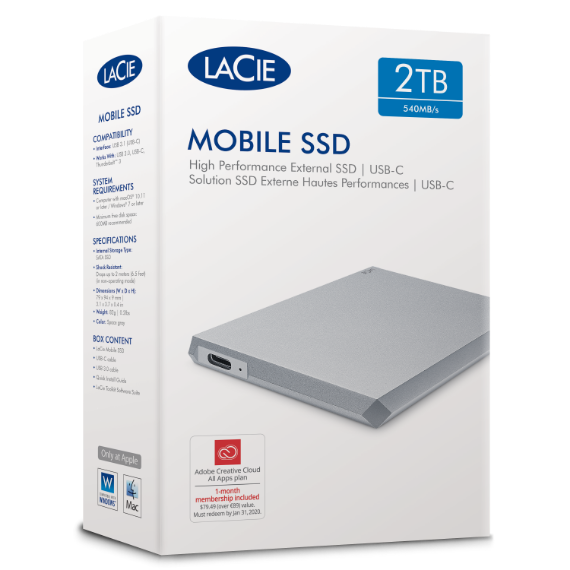

- #Lacie backup drive encrypted archive#
- #Lacie backup drive encrypted full#
- #Lacie backup drive encrypted software#
- #Lacie backup drive encrypted free#
If you modify or delete a file on the source, then that modification or deletion will happen on the destination. With a 2-way sync, changes made in one location will be applied to the synced files in the other location. Sync comes in two primary forms, 2-way sync and 1-way sync. There are some functional differences between the traditional backup and syncing which are important to be aware of when using sync. The primary goal of a sync job is to keep a source, typically your computer, and a destination, typically your external drive, synchronised at all times. Sync is similar to File Backup because it is typically a data only backup, so no applications or system files. When archiving data, it is common to use a DVD, Blu-ray disc, or Magnetic Tape as storage media since these are cost-effective methods for storing a large amount of data that does not have to be accessed for long periods of time.
#Lacie backup drive encrypted archive#
The main difference between an Archive and a Backup is that, in a Backup, files are kept on both the original drive and the secondary drive.Īrchived files on the other hand are normally deleted from the source, e.g. Unless the archived data is also copied to a secondary location, a second archive, this method is not recommended. Because this method results in only having a single copy of your data, this cannot truly be considered a backup.
#Lacie backup drive encrypted free#
This is the process by which you store the files on a single storage media with no secondary copies because you are trying to free up as much space as possible.
#Lacie backup drive encrypted software#
Some software even offers the ability to compress these backups to save on storage space and can prevent unauthorised access by protecting them with passwords and encryption. Some backup software can automatically copy data into a single file that can later be read and restored by the original backup applications, or explored through Windows Explorer/File Explorer, (My) Computer/This PC, and Finder to restore individual files. As a result, it's easier and more cost-effective to make frequent backups of multiple versions of data.
#Lacie backup drive encrypted full#
The files that are backed up are not deleted from the original source.īacking up data is typically more efficient than copying manually and often takes up less space on the backup storage media because you can make incremental backups, as opposed to full backups. This approach backs up regular data only by making a second copy in a second location, but will not back up applications or other system files. This is a good way to recover from major hardware failure, or reinstalling the operating system, without having to spend a lot of time also reinstalling programs, restoring emails and files, etc. This is a way of backing up a computer (files, applications, and system files) which allows storing the computer’s entire collection of available data, including operating system and program files, in a single file (an “Image”) which can later be used to restore the computer to exactly the way it was when the image was originally made. What is the difference between Imaging, File Backup, Archiving and Sync? 1 copy kept off-site or in a remote location.3 copies of the data including the original.The most commonly mentioned strategy is the 3-2-1 Backup, which states: To save your data, time, and money, it is vital to develop a backup strategy which keeps your data safe, and to choose hardware and software that fits with your strategy. Once costly and complex, backups are now inexpensive, simple to use, and depending on the solution, completely automated. Files can get corrupted and hardware can fail no matter how recently the files were created, or how new or reliable the computer. It is vital to always have a good backup solution in place. Important note – RAID is NOT considered a self-contained backup, but it can serve as one copy of the data. This is the best way to prevent data loss in case of drive failure. So, should you start running out of space on your internal drive and need to move data to external storage, always make sure that a second copy is made on any other media you might choose (another external hard drive, DVDs/Blu-rays, Cloud Backup, etc.) The type of backup is less important than simply having that second copy available. After creating this second copy of data, if you delete the original data on your computer, this means that there is no longer a backup of that data, only a single copy again.


This means having important data in a second physical location, such as an external hard drive, DVDs/Blu-rays, local NAS, Cloud Backup, etc. The primary goal of a backup is to avoid data loss.


 0 kommentar(er)
0 kommentar(er)
